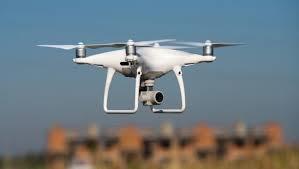News / National
Zimbabwe's ZESA launches drone aviation training
10 Jun 2025 at 13:00hrs | Views

In a landmark development aimed at strengthening Zimbabwe's energy and digital infrastructure, ZESA Holdings has launched its certified Aviation Training Organisation (ATO) and graduated 235 students from its National Training Centre.
The dual events, held at the utility's training facility in Harare, were officiated by ZESA Executive Chairman Dr. Sydney Gata, who underscored the importance of upskilling in realising national development goals.
The newly established ATO marks the formal rollout of a structured drone training programme, designed to equip Zimbabweans with critical technical competencies for the emerging digital economy.
"The certification we unveil today is not merely a badge of honour. It stands as a cornerstone in our commitment to creating the skills necessary for a digital economy," Dr. Gata said.
The drone programme will focus on areas such as drone operation, maintenance, and regulatory compliance, with a vision to support innovation and resilience in energy, agriculture, mining, logistics, and other strategic sectors. Dr. Gata cited China's successful adoption of drone technology to develop a low-altitude economy, describing it as a model Zimbabwe could emulate.
"With institutions like the ZESA National Training Centre, we too can reach similar milestones in the near future," he said, adding that the initiative is in full alignment with the Government's Education 5.0 policy, which places emphasis on innovation, industrialisation, and problem-solving.
At the same event, 235 students were awarded National Certificates and Diplomas in Electrical Power Engineering, Power Plant Operations, and Line Construction and Maintenance. Dr. Gata applauded the graduates and reflected on the origins of the training centre, which was established in response to the post-independence skills vacuum.
"ZESA had witnessed a significant exodus of its skilled personnel and local institutions lacked the capacity to meet our manpower needs. This inspired the creation of our own training centre," he said.
He further highlighted the pivotal role graduates would play in tackling national challenges such as aging infrastructure, rising electricity demand, technical losses, and climate-related disruptions.
"Whether you restore faults, optimise plant performance, or install new systems, your work directly contributes to our mission of achieving Total Access to Power and Data by 2030," Dr. Gata stated.
He also pointed to improvements in electricity generation and the recent allocation of 150MW towards winter wheat farming as signs of progress under President Emmerson Mnangagwa's Vision 2030.
Dr. Gata urged ZESA management to ensure graduates are given opportunities to apply their expertise, warning that talent development and retention were vital to ongoing reforms.
"We are not just powering homes and businesses. We are enabling development, creating opportunities and driving inclusive growth," he concluded.
The events signal a bold step forward for ZESA as it aligns its operations with national transformation objectives, focusing on sustainable energy, digital skills, and homegrown capacity-building.
The dual events, held at the utility's training facility in Harare, were officiated by ZESA Executive Chairman Dr. Sydney Gata, who underscored the importance of upskilling in realising national development goals.
The newly established ATO marks the formal rollout of a structured drone training programme, designed to equip Zimbabweans with critical technical competencies for the emerging digital economy.
"The certification we unveil today is not merely a badge of honour. It stands as a cornerstone in our commitment to creating the skills necessary for a digital economy," Dr. Gata said.
The drone programme will focus on areas such as drone operation, maintenance, and regulatory compliance, with a vision to support innovation and resilience in energy, agriculture, mining, logistics, and other strategic sectors. Dr. Gata cited China's successful adoption of drone technology to develop a low-altitude economy, describing it as a model Zimbabwe could emulate.
"With institutions like the ZESA National Training Centre, we too can reach similar milestones in the near future," he said, adding that the initiative is in full alignment with the Government's Education 5.0 policy, which places emphasis on innovation, industrialisation, and problem-solving.
At the same event, 235 students were awarded National Certificates and Diplomas in Electrical Power Engineering, Power Plant Operations, and Line Construction and Maintenance. Dr. Gata applauded the graduates and reflected on the origins of the training centre, which was established in response to the post-independence skills vacuum.
He further highlighted the pivotal role graduates would play in tackling national challenges such as aging infrastructure, rising electricity demand, technical losses, and climate-related disruptions.
"Whether you restore faults, optimise plant performance, or install new systems, your work directly contributes to our mission of achieving Total Access to Power and Data by 2030," Dr. Gata stated.
He also pointed to improvements in electricity generation and the recent allocation of 150MW towards winter wheat farming as signs of progress under President Emmerson Mnangagwa's Vision 2030.
Dr. Gata urged ZESA management to ensure graduates are given opportunities to apply their expertise, warning that talent development and retention were vital to ongoing reforms.
"We are not just powering homes and businesses. We are enabling development, creating opportunities and driving inclusive growth," he concluded.
The events signal a bold step forward for ZESA as it aligns its operations with national transformation objectives, focusing on sustainable energy, digital skills, and homegrown capacity-building.
Source - The Herald



















